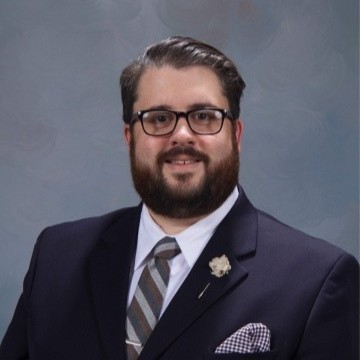From participant to branch chief: ORISE postdoctoral fellowship serves as career springboard
Meet Michael Rowland, Ph.D.
Michael Rowland, Ph.D., always knew he wanted to pursue a STEM career. His father, a pediatrician, and his mother, a mathematics teacher, nurtured his interest in science, and before long their house was filled with rock collections, microscopes and chemistry sets he had received as presents. By middle and high school, Rowland was reading books by noted physicists Stephen Hawking and Richard Feynman.

A former ORISE postdoctoral fellow, Michael Rowland, Ph.D., is now a branch chief with the U.S. Army Corps of Engineers’ Engineer Research and Development Center.
Rowland attended the University of North Carolina at Chapel Hill, where he received a bachelor’s degree in biology. He went on to earn a doctoral degree in computational biology from the University of Kansas. After defending his dissertation, Rowland came across an Oak Ridge Institute for Science and Education (ORISE) fellowship with the U.S. Army Corps of Engineers (USACE) Engineer Research and Development Center (ERDC).
Carrying on the ‘family legacy’
ERDC, based in Vicksburg, Mississippi, helps solve the nation’s most challenging problems in civil and military engineering, geospatial sciences, water resources and environmental sciences for the Army, the U.S. Department of Defense, civilian agencies and the nation’s public good.
For Rowland, an ORISE fellowship at ERDC was a perfect fit.
“I had defended my dissertation and was exploring career options,” he recalled. “The opportunity to conduct research with the U.S. Army Corps of Engineers intrigued me, as my grandfather was an engineer for the Corps. It felt like taking part in a family legacy.” During his two-year ORISE fellowship at ERDC’s Environmental Laboratory (EL), Rowland developed and analyzed computational models focused on predicting adverse effects of chemicals in zebrafish. This research will help determine the safety and environmental impacts of Army materials. His mentor for the project was ERDC Research Physicist Michael Mayo, Ph.D.
Joining ERDC full-time
Following his ORISE fellowship, Rowland was hired on full-time as an ERDC research biologist. Initially in this role, he continued the zebrafish research that he had started as an ORISE fellow. For this work, he won the 2018 Army Modeling and Simulation Award and the 2019 ERDC Research and Development Achievement Award.
Rowland soon tackled new research areas, including population swarm models, LIDAR (Light Detection and Ranging) image analysis and road network analysis.
Most recently, Rowland was among the first researchers tapped by ERDC leadership to produce epidemiological models to forecast COVID-19 case numbers to guide the Corps’ pandemic response efforts. The team grew to more than 30 people drawn from four of the seven ERDC laboratories. The forecasts produced by the model now inform the Corps, are included in reports for the Federal Emergency Management Agency and are part of the forecast ensemble used by the Centers for Disease Control and Prevention.
Taking on leadership roles
In 2019, Rowland got his first taste of front-line management as acting chief of the EL’s Environmental Risk Assessment Branch. He then gained experience in the Office of the Technical Directors as an acting programs manager for basic research in the Installations and Operational Environment Research and Development Area.
In 2020, Rowland assumed the role of acting chief of the Environmental Laboratory’s Environmental Processes Branch. Later in the year, he accepted a permanent position as chief of the EL’s Environmental Engineering Branch.
Launching a career at ERDC
Through his ORISE fellowship experience, Rowland learned the importance of being flexible when it comes to scientific research.
“My ORISE postdoc project was my first foray into applying my skills to problems outside of cell signaling,” he said. “While it took some getting used to a new field, it proved invaluable in my conversion to a research biologist at ERDC. I still use the approaches I picked up during my ORISE project in current work.”
Most importantly, the fellowship introduced Rowland to ERDC and the breadth of impactful research happening there.
“I fell in love with all of it,” he said, “and plan on spending my career here.”
The research participation program at ERDC is administered by the Oak Ridge Institute for Science and Education (ORISE) under an agreement between the U.S. Department of Defense (DoD) and the U.S. Department of Energy (DOE). ORISE is managed for DOE by ORAU.

